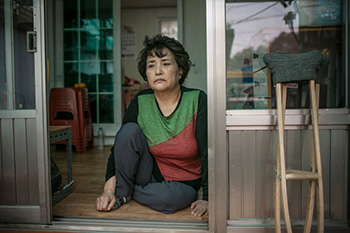
YEONGJU, South Korea — Kwon Pil-ju is trying desperately to teach herself English before she is reunited in the coming weeks with a son she sent away almost 40 years ago.
韩国荣州——权碧主(Kwon Pil-ju,音)在拼命地自学英语,因为几周后,她要与近40年前送走的儿子团聚。
“I have so much to tell him, especially how sorry I am,” she said, sitting in her bedroom, which doubles as her kitchen, in her one-floor rural home in Yeongju. “But I am at a loss, because I don’t know English and he can’t speak Korean.”
“我有很多话要对他说,尤其是我多么对不起他,”她坐在荣州一所一层农舍的卧室兼厨房里说。“但我不知道该怎么说,因为我不懂英语,他又不会说韩语。”
Her son is Adam Crapser, 41, a Korean adoptee who is awaiting deportation from an immigration detention center in Washington State because he lacks American citizenship, even though he has lived in the United States since he was 3 years old. Last month, an immigration court denied his final request to stay in the United States.
她的儿子是41岁的亚当•克拉普塞尔(Adam Crapser)。他是一名被收养的韩国人,现在正在华盛顿州一家移民拘留中心等待被驱逐出境。尽管他从3岁起就生活在美国,他却没有美国公民身份。上月,一个移民法庭拒绝了他留在美国的最后一次申请。
Until Mr. Crapser’s fate was reported in a documentary broadcast by South Korea’s MBC-TV last year, Ms. Kwon did not even know that the son she gave up in 1978 had been in the United States.
在去年韩国MBC-TV电视台的一部纪录片报道克拉普塞尔的命运之前,权女士甚至不知道自己1978年放弃的儿子在美国。
As it turned out, the boy she called Shin Song-hyuk was one of 200,000 South Korean children sent abroad for adoption since the end of the Korean War, most of them to the United States.
事实上,被她称为申颂赫(Shin Song-hyuk,音)的男孩是朝鲜战争结束后被送出国收养的20万韩国儿童之一,其中大多数被送往美国。
South Koreans have lamented their country’s international reputation as a leading baby exporter. But in a society that held deep prejudices against single mothers and children born outside marriage, and that shunned domestic adoptions, sending children abroad was often the best option for poor South Korean women. Adoption agencies solicited their babies, promising better lives abroad.
韩国人一直哀叹于自己国家作为主要婴儿输出国的国际声誉。但是,韩国社会对单亲妈妈和私生子存在深刻偏见,而且排斥国内收养,所以对贫穷的韩国女性来说,把孩子送往国外收养往往是最佳选择。收养机构招揽她们的婴儿,并向她们承诺,孩子会在国外过上更好的生活。
In recent years, however, some have returned to South Korea as adults, reporting adoptions gone wrong.
但是,近些年,有些人在成年后返回韩国,称收养出了问题。
Some of the most wrenching stories have come from those who were deported back to South Korea. Like Mr. Crapser, they were abused or abandoned by their adoptive parents. Only after they ran afoul of the law did they learn that they were not American citizens, their parents having never filed citizenship paperwork for them.
其中最悲惨的故事来自那些被遣返回韩国的人。和克拉普塞尔一样,他们受到养父母的虐待或被抛弃。他们只有在违法后才知道自己不是美国公民,养父母从未给他们办理入籍手续。
Officials at South Korea’s Ministry of Health and Welfare say they know of at least five adoptees who were deported back from the United States. But advocates for Korean adoptees say there may be more than twice as many, some undocumented.
韩国保健福祉部(Ministry of Health and Welfare )的官员称,他们知道至少有五名被收养者被从美国遣返回来。但是,韩国收养儿权益的倡导者称,实际人数可能是这个数字的两倍多,有些人没被记录在案。
Tossed back to a country they had left decades ago, these adoptees were once again foreigners struggling to adapt to an unfamiliar culture and language.
被赶回数十年前离开的国家后,这些被收养者再次成为努力适应不熟悉的文化和语言的外国人。
The television documentary that reported Mr. Crapser’s plight also included the story of a 44-year-old adoptee named Monte Haines, or Han Ho-kyu, who served in the United States military in the 1990s. He was deported to South Korea in 2009 after he was caught driving a truck carrying illegal drugs. Some adoptees had severe mental illnesses and became homeless when they returned to a country that was never truly their home.
那部记录克拉普塞尔遭遇的电视纪录片还提到一个名为蒙特•海恩斯(Monte Haines)或韩浩奎(Han Ho-kyu,音)的44岁被收养者的故事。他曾在20世纪90年代在美国军中服役。2009年,他开着一辆装有非法毒品的卡车被抓后,被遣返回韩国。有些被收养者患有严重的精神疾病,回到这个从未真正是其家乡的国家之后,变得无家可归。
At least Mr. Crapser has a birth mother waiting for him.
至少,克拉普塞尔还有个生母在等他。
Ms. Kwon, 61, spends hours filling ruled pages with the letters of the English alphabet, copied down in a shaky hand. It’s slow going for a woman with no formal education, but she wants to be able to explain herself to her son.
61岁的权女士花费数小时整理那些横格纸,上面有她用颤抖的手抄写的英文字母。对一个从未受过正规教育的女性来说,进展非常缓慢,但她希望自己能够向儿子表达自己的想法。
“I have never imagined that he was having this hard life of his,” she said, wiping away tears. “I should have kept him even if we starved together. What I did was an unforgivable sin.”
“我从没想到,他的生活这么艰辛,”她擦去眼泪说,“我应该把他留在身边,哪怕我们一起挨饿。我做的孽不可饶恕。”
When she was a child, Ms. Kwon received acupuncture therapy that went horribly wrong, leaving her left leg shriveled and paralyzed. Her alcoholic father sent her to live with a man with cerebral palsy. A year and a half later, she met a carpenter with whom she had three children: a daughter and two sons, including a boy born in 1975, Shin Song-hyuk, who would become Adam Crapser.
权女士小时候接受针灸治疗时出现严重问题,左腿萎缩、瘫痪。酒鬼父亲把她送去跟一个脑瘫男人生活。一年半后,她遇见一个木匠,跟他生了三个孩子:一个女儿和两个儿子,包括1975年出生的申颂赫,也就是后来的亚当•克拉普塞尔。
The carpenter often kicked and punched Ms. Kwon, she said, and he eventually abandoned her and her young children.
她说,那个木匠经常对她拳打脚踢,最后抛弃了她和年幼的孩子们。
Ms. Kwon could not pay her rent. Her father was too poor to take her and her children in.
当时她付不起房租。她的父亲又太穷,不肯收留她和孩子们。
In 1978, she gave her youngest son to a childless family. She took her daughter and Song-hyuk, then 3, to a local orphanage that arranged adoptions. She saw her children playing with toys and other children, and left without saying goodbye for fear they would follow her.
1978年,她把最小的儿子送给一个没有孩子的家庭。她把女儿和当时3岁的颂赫送到当地一家安排收养的孤儿院。她看见孩子们玩玩具,和其他孩子一起玩。因为担心他们会跟着她,她没跟孩子们告别就离开了。
Last year, Ms. Kwon got a call from a relative who remembered Song-hyuk and had watched the television documentary. In it, Mr. Crapser called out for his birth mother.
去年,她接到一个亲戚的电话,那个亲戚还记得颂赫,而且看到了那部电视纪录片。克拉普塞尔在片中向生母求助。
“Remember, Eomma, I am always your son, your flesh and blood,” he said, using the Korean word for mom.
“记住,Eomma,我永远是你的儿子,是你的血肉,”他说,用韩语发音来称呼妈妈。
Ms. Kwon contacted the documentary’s producer, Kim Bo-seul, who arranged a video chat between the mother and son, and a DNA test to confirm their relationship.
权女士联系了那部纪录片的制作人金宝雪(Kim Bo-seul,音),后者安排这对母子进行视频通话,并进行DNA检测,以确定他们的母子关系。
Mr. Crapser, who has a wife, a daughter and two stepdaughters, communicated with his biological mother through an interpreter. He expects to be deported in the coming weeks and will reunite with his mother, who plans to decorate a small room in her house for her son.
克拉普塞尔有个妻子、一个女儿和两名继女,他通过翻译与生母交谈。几周后,他会被遣返回国,与母亲团聚,后者计划在自己的房子里给儿子布置一小间居室。
Ms. Kwon said she had trouble sleeping, thinking of what she would tell her son and what she should feed him when he arrives.
权女士说自己睡不好,一直在想要跟儿子说什么,他来了以后给他做什么吃的。
“I am still poor, but I owe him a lot of love,” she said.
“我依然很穷,但我欠他很多爱,”她说 。












